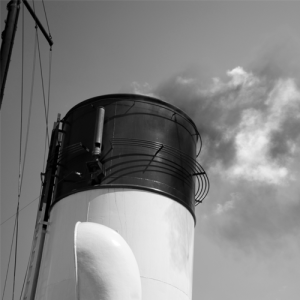Livingston v. Van Ingen: NY Appeals Court Tackles Commerce Clause
Historical
In Livingston v. Van Ingen, 9 Johns. R. 507 N.Y. 1812, the New York Court for the Correction of Errors upheld a New York statute authorizing a monopoly on steam boat transportation in New York waters. The appeals court decision, which was later nullified by the U.S. Supreme Court’s holding in Gibbons v. Ogden, highlights the tensions that existed between state and federal regulation as the new nation grew its economy.
The Facts of Livingston v. Van Ingen
In 1808, the state of New York passed a law granting Robert R. Livingston and Robert Fulton the exclusive right to navigate the waters of the State with steamboats, which were a relatively new form of transportation. Under the statute, all steamboats operating in New York waters were required to obtain a license from Livingston and Fulton. If a license was not obtained, the vessels were subject to forfeiture.
James Van Ingen co-owned two steamboats, the Hope and the Perseverance, which provided ferry service on the Hudson River. When Livingston and Fulton discovered that Van Ingen did not secure a license, they filed suit, seeking to prohibit the operation of the steamboats in violation of the New York law. However, the court refused to grant an injunction. Livingston and Fulton appealed to the New York Court for the Correction of Errors.
The Legal Background of Livingston v. Van Ingen
The case centered on how to interpret Article 1, Section 8, Clause 3 of the U.S. Constitution, otherwise known as the Commerce Clause. It states that Congress is specifically empowered “to regulate Commerce with foreign Nations, and among several States, and with the Indian Tribes.” More simply put, the Commerce Clause gives Congress exclusive authority over commercial activities among the states and with foreign countries and Indian tribes. Under this framework, the individual states can only regulate intrastate commerce that takes place exclusively within their borders.
The Court’s Decision on Livingston v. Van Ingen
The New York appeals court overturned the decision, finding that the “exclusive right to navigate the waters of this state by boats propelled by fire or steam, is constitutional.” It ordered the lower court to grant the injunction in favor of Livingston and Fulton.
As was customary at the time, Justices Yates, Thompson and Kent all authored individual opinions. Justice Kent’s is most frequently cited for his discussion of the distinction between “internal” and “external” commerce. He explained his reasoning as follows:
[T]he states are under no other constitutional restriction, and are, consequently, left in possession of a vast field of commercial regulation; all the internal commerce of the state by land and water remains entirely, and I may say exclusively, within the scope of its original sovereignty. The congressional power relates to external not to internal commerce, and it is confined to the regulation of that commerce.
The decision of the New York appeals court did not resolve the Commerce Clause controversy or the battle over the steamboat monopoly. More than a decade later, the U.S. Supreme Court decided Gibbons v. Ogden. In the landmark case, the Court invalidated the New York statute authorizing the monopoly. More importantly, the Court held that the Constitution authorizes Congress to regulate any form of commerce that crosses state lines.
Previous Articles
SCOTUS Wraps Up Oral Arguments for the Term
by DONALD SCARINCI on May 17, 2022
The U.S. Supreme Court has concluded its oral arguments for the October 2021 Term. The justices hea...
SCOTUS Rules Censure of Elected Board Member Didn’t Violate First Amendment
by DONALD SCARINCI on May 10, 2022
In Houston Community College System v. Wilson, 595 U.S. ____ (2022), the U.S. Supreme Court held th...
Supreme Court Breach Is Not the First Involving Roe v. Wade
by DONALD SCARINCI on
The recent disclosure of Justice Samuel Alito’s decision purporting to overturn Roe v. Wade is ar...
The Amendments
-
Amendment1
- Establishment ClauseFree Exercise Clause
- Freedom of Speech
- Freedoms of Press
- Freedom of Assembly, and Petitition
-
Amendment2
- The Right to Bear Arms
-
Amendment4
- Unreasonable Searches and Seizures
-
Amendment5
- Due Process
- Eminent Domain
- Rights of Criminal Defendants
Preamble to the Bill of Rights
Congress of the United States begun and held at the City of New-York, on Wednesday the fourth of March, one thousand seven hundred and eighty nine.
THE Conventions of a number of the States, having at the time of their adopting the Constitution, expressed a desire, in order to prevent misconstruction or abuse of its powers, that further declaratory and restrictive clauses should be added: And as extending the ground of public confidence in the Government, will best ensure the beneficent ends of its institution.




